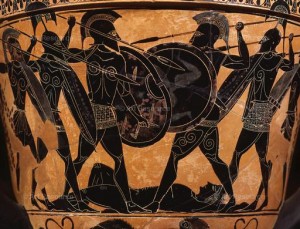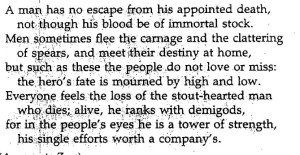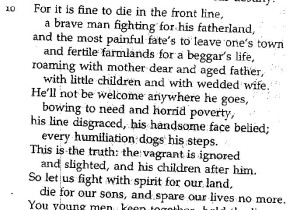 I’ve been reading ancient Greek tragedies by Aeschylus, Sophocles, and Euripides, and other poets, and trying to wrap my head around a culture that celebrated war and glorious death in battle. It was the unquestioned and unquestionable fate of healthy young men (and they all were healthy, because the ancient Greeks practiced infanticide).
I’ve been reading ancient Greek tragedies by Aeschylus, Sophocles, and Euripides, and other poets, and trying to wrap my head around a culture that celebrated war and glorious death in battle. It was the unquestioned and unquestionable fate of healthy young men (and they all were healthy, because the ancient Greeks practiced infanticide).
Here are statements by ancient lyric poets about how war and death in battle define the good life, Lyric Poet Callinus first, then Lyric poet Tyrtaeus.


Who would believe that tripe? Those sound like modern recruitment messages from ISIS. Die in battle for the cause and enjoy everlasting glory! Along with 72 raisins. I guess there’s always somebody ready to believe such messages.
The glorification of war might have been more sincere then, but it seems that much of it was cynical manipulation of the populace for the personal gain of the oligarchy that ran the country and stood to benefit from war. The same then as now.
Yet the entire world of ancient Greek culture was based on that thesis and it seemed to work for them. Dissenters are hard to find. It seems like such an alien culture to the modern mind.
Then someone in the class asked about the translation of the word, “Hades.” Did it mean “Hell?”
The professor explained that Hades was where all the ancient dead went, good or bad. There were no distinct domains of heaven and hell with their associated moral judgements, because, after all, this was very much pre-Christian society.
The student, an elderly woman, shook her head in despair. “So they just didn’t know the truth,” she concluded softly.
I was shocked by her conclusion. Pity those poor ignorant ancients. They were uninformed about the crucial distinction between heaven and hell.
How could anybody in the modern world reach such a conclusion? It was stunning to me, and I realized, that woman’s world was as alien to me as the warrior culture of ancient Greece.
You don’t have to travel back in time three thousand years to find a belief systme that seems utterly alien.
